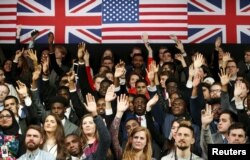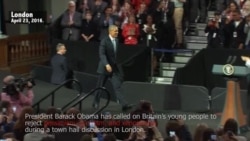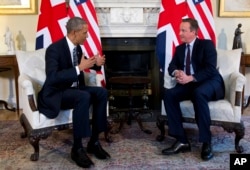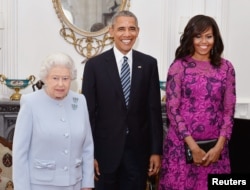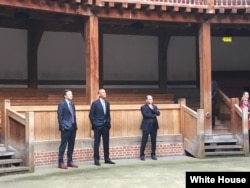President Barack Obama has called on Britain’s young people to reject pessimism, cynicism, and xenophobia during a town hall discussion in London Saturday, a day after he dealt with stinging criticism over his remarks expressing support for Britain to stay in the European Union.
The U.S. president said that in times of change, there is a temptation to forge identities, "tribal identities that give you a sense of certainty, a buffer against change." Obama said that is something they "have to fight against.” Globalization and integration, he said, should be seen "not as threats, but as opportunities."
Obama took questions on a wide range of topics, including what he would like to see the next president do and what he wants his legacy to reflect when his time as president is up.
He said he would have to wait about 10 years before he can look back and accurately assess his legacy, but "I think I've been true to myself in the process."
Legacy
"I'll look at my scorecard at the end... but I'm proud," he said.
Obama mentioned his landmark health care bill, the global response to the Ebola crisis and the Iran nuclear deal as notable achievements, but, in terms of his largest accomplishment: “saving the world economy from a great depression – that was pretty good,” he joked, referencing the 2008 financial crisis.
Another young woman in the audience asked which of the social movements that took place during his presidency helped to change his mind the most, to which Obama cited his evolving view on marriage equality.
At first, Obama said, he was in favor of civil unions because he thought labelling those relationships as marriages was not necessary as long as the people involved were getting the same rights, but his children had a great impact on changing that point of view.
“It’s not simply about legal rights, but the sense of stigma," he said. "If you’re calling it something else, it means less in the eyes of society.”
Watch: Obama Addresses Town Hall
Brexit criticism
The U.S leader got an enthusiastic welcome from the audience of mostly young people who had a chance to ask him questions.
The welcome was in stark contrast to Friday, when Obama received strong criticism for calling on Britain to stay in the European Union.
“I don’t believe the EU moderates British influence in the world, it magnifies it,” the U.S. leader said at a joint news conference with British Prime Minister David Cameron following their meeting on Friday.
The statements drew a sharp rebuke from those who back Britain’s exit, a matter that will be up for British voters to decide in a June 23rd referendum.
Right-wing U.K. Independence Party leader Nigel Farage had strong words for the U.S. leader, saying he should “butt out.”
London Mayor Boris Johnson described Mr. Obama’s statements as hypocritical and “perverse” and said U.S. leaders “would never contemplate anything like the EU for themselves.”
The London mayor himself triggered controversy, when he referred to the U.S. leader as being a “part-Kenyan” president with an “ancestral dislike” of the British empire.
Throughout his three-day stay in Britain, Obama has sought to dispel any notion of being against British history and tradition. On Friday, he said he had to confess that part of his reason for traveling to Britain was to wish Queen Elizabeth II a happy 90th birthday.
Obama said the monarch, whose birthday was Thursday, as a “real jewel to the world,” not just Britain.
On Saturday, his last full day in London, the U.S. president toured William Shakespeare’s Globe Theatre, marking the 400th anniversary of English playwright’s death. He saw a performance of a play drawn from Shakespeare’s Hamlet.
Obama also met privately with British opposition leader Jeremy Corbyn. The Saturday meeting had not previously been on the U.S. leader’s schedule.
The White House said they discussed the impact of globalization on labor and the need to take steps to reduce inequality around the world. It said Obama and Corbyn also agreed that the UK should remain in the EU.





